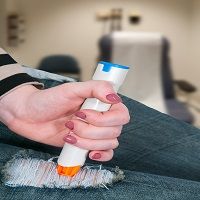Article
Many States Now Require Schools to Stock Epinephrine Autoinjectors
Author(s):
Over the past year, school officials in several of the nation's largest states have implemented new policies to address the growing prevalence and severity of pediatric allergies by increasing access to epinephrine auto-injectors.

Over the past year, school officials in several of the nation’s largest states have implemented new policies to address the growing prevalence and severity of pediatric allergies by increasing access to epinephrine auto-injectors.
California, the most populous state of all, requires every one of its schools to stock at least 1 such device for the treatment of anaphylaxis as of January 2015. California joined 6 other states with similar laws — Maryland, Michigan, Nebraska, Nevada, North Carolina and Virginia — and public health advocates believe the move will save lives.
California’s public schools alone have more than 6.2 million children, housed in more than 10,000 different facilities. Many individual children with diagnosed allergies carried auto-injectors before the law passed, but thousands of schools did not stock the devices for use on children with undiagnosed allergies. Following passage of the law, all those schools are required to have both devices and at least 1 staff member trained to use them properly.
Officials in New Jersey enacted similar legislation in February 2015. Prior to that, New Jersey state laws not only permitted schools to decide against stocking auto-injectors but also forbade school employees from administering epinephrine to students who lack formal allergy diagnoses, even during obvious cases of anaphylaxis.
The law now requires schools to stock a supply of epinephrine auto-injectors. It also provides immunity to nurses and other trained personnel who use them in cases of emergency.
Pennsylvania passed a law that went into effect in January 2015 permitting schools to stock epinephrine auto-injectors if they choose to do so. The legislation also directed schools to train people at every school to use such devices should an emergency arise.
“Allowing schools to store and administer epinephrine in an emergency has been proven to save lives. This law will help schools ensure that all students, not just those who have been previously diagnosed, are protected from potentially life-threatening allergies,” said Lynda Mitchell, Founder and Vice President of Kids With Food Allergies.
Similar legislation that was passed in New York gives schools in that state the option of stocking auto-injectors without creating any obligation for them to do so. A second law gives students in New York the right to carry auto-injectors that have been prescribed to them and use them as needed rather than storing them with the school and relying upon school employees to diagnose and treat anaphylaxis.
This means that kids in all 50 states can carry prescription auto-injectors with them in school without breaking any law.
This flurry of activity on the state level followed the passage of the federal School Access to Emergency Epinephrine Act, which gave preference for certain grants to states that develop plans for schools to administer epinephrine to students when emergencies rise during school hours.
States are also acting in response to recent research finding that auto-injectors at schools ameliorate serious attacks and sometimes save lives. For example, a study that was presented at the annual meeting of the American College of Allergy, Asthma and Immunology found that stocked emergency epinephrine was used on 35 children and 3 adults in Chicago schools in just 1 year.
Another catalyst for action was the 2012 death of a 7-year-old Virginia girl whose school district only allowed staff members to give epinephrine to students who had previously documented allergies and prescriptions for the drug.




